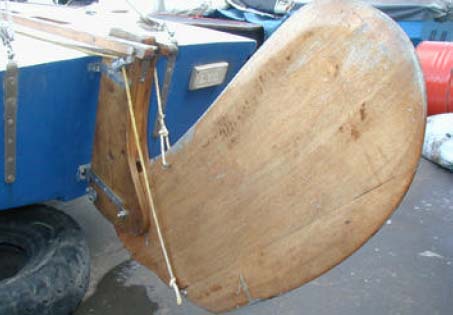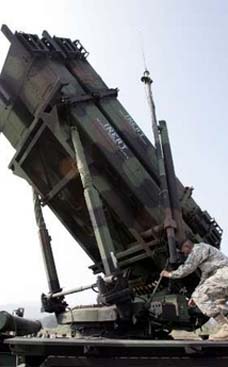
"One of my assignments was to build a three-room school in a remote vil- lage. It was a challenge. There was no water at the site. We wound up filling dump trucks with water in the main market town and transporting it 35 kilometers over washboard clay roads to the village, where we dropped it into a temporary cinder block cistern we’d built. When it came time to put together our roof trusses, I needed heavy iron bolts and nuts. I searched over all Togo. No bolts, no nuts. I thought of Seydou. There had to be a way. And there was. Coached by the Togolese carpenters, I bought a portable forge and a pile of flat iron and another pile of reinforcing rod. I hired a blacksmith to fabricate bolts and nuts. He cut the rod into usable bolt lengths and welded a square of flat iron to one end, threading the other. He made other squares of flat iron, cut holes through their centers and threaded them inside for nuts."
Joel Thurtell writes: It’s something I saw many times in my tour as a Peace Corps Volunteer in Togo, West Africa 30 years ago: The talent for taking a piece of trash and making something that does something neat.
Heavyweights - Adventures in Wooden Boating
Joel Thurtell
Copyright Joel Thurtell 2003 I thought of Seydou’s tires when I looked at the pictures of those African Lightnings.
What do a 12-year-old kid’s re-inven- tion of the bicycle tire have to do with Lightning sailboats?
African ingenuity.
It’s something I saw many times in my tour as a Peace Corps Volunteer in Togo, West Africa 30 years ago: The talent for taking a piece of trash and making something that does something neat.
Seydou was the kid who lived next door to us in northern Togo, in the sub-Sahara. Somebody gave Seydou a small bike whose wheels would not take standard size tires and inner tubes. The bike was no good without tires, and this was an active kid with a powerful need to move about on a bike. So Seydou scrounged around and found cast-off inner tubes and tires that were too large for the little wheels of his bike. He cut sections out of the inner tubes and the same for the tires. He glued them back together with patching cement, put them on his wheels, pumped them up and rode happily around on his bike until the air pressure inside that tube and maybe a too-hard bounce against the ground would produce the inevitable flat. That happened at least once a day, and then Seydou would be back at work with his patching cement.
One of my assignments was to build a three-room school in a remote vil- lage. It was a challenge. There was no water at the site. We wound up filling dump trucks with water in the main market town and transporting it 35 kilometers over washboard clay roads to the village, where we dropped it into a temporary cinder block cistern we’d built. When it came time to put together our roof trusses, I needed heavy iron bolts and nuts. I searched over all Togo. No bolts, no nuts. I thought of Seydou. There had to be a way. And there was. Coached by the Togolese carpenters, I bought a portable forge and a pile of flat iron and another pile of reinforcing rod. I hired a blacksmith to fabricate bolts and nuts. He cut the rod into usable bolt lengths and welded a square of flat iron to one end, threading the other. He made other squares of flat iron, cut holes through their centers and threaded them inside for nuts. It had been years since I thought about those bolts and nuts, but a while back I opened an email from Helmut Braun writing from Lagos, Nigeria. Helmut read my Flashes col- umn about kickup rudders and wanted me to know that kickup rud- ders – he calls them “lifting” rudders – are a necessity for sailing in waters off Lagos, regardless of what ILCA rules say.
So, many years ago, Helmut designed a lifting rudder and had it built by a carpenter at the Lagos Yacht Club. Like my own movable rudder, it has a bolt or pin that allows it to be raised as the boat approaches a sandbar or any of the chunks of debris – abandoned fish- ing nets, sunken boats, logs, maybe even a junk car – that litter the waters around Lagos.
Here’s Helmut’s description of sail- ing conditions. I had asked him about crocodiles because I had some fascinating encounters with these big reptiles in northern Togo. “About crocodiles, I don't think there are any left. I have neither seen one nor heard of anybody seeing one during the last 15 years of my stay in Lagos.
“It is too dangerous for us to beach a Lightning at the sea coast. We once lost a Hobie 16 who tried it and dis- integrated. The breakers are too vicious. We therefore sail along the creeks (inland waterways) running parallel to the coastline.
“In some places there are only 500 meters between the creek and the sea. There are a lot of beach huts (thatched roof bamboo huts) with jetties along the creek where we can stop and walk across to the sea. The creeks are tidal waters and at low tide can be very shallow. That's when we need the lifting rudders to cross the sandbanks or get alongside the jetties. The Lagos harbor waters are strongly polluted with plastic bags and other rubbish. In addition after the rainy season, there is a lot of water hyacinth around. That's when we need the lifting rudders again since the stuff clings to the center- boards and rudders like glue. Sometimes you get the feeling as if they had been waiting for that poor sailing dinghy to pass by and then jam it up.
“Oh Lord, isn't it tough in the trop- ics!”
I’ve never been to Lagos, but I spent some time on beaches at Lome, the capital and port town in Togo facing the same stretch of Atlantic Ocean as Lagos. I recall having to pick careful- ly a spot to place my beach towel because people used the beach as a bathroom. I recall the streets of Lome being littered with ancient abandoned cars and lesser trash and can well imagine that the waters also have been treated as a landfill. Come to think of it, though, I remember seeing junk cars and debris in the Rouge River here in Wayne County, Michigan, and today’s New York Times reports that people are now pulling up old bombs and toxic chemicals from the Baltic Sea, dumped there by the Americans, British and Soviets after World War II. So maybe fish nests and feces are not so bad.
Lifting rudders are standard equip- ment on Nigerian Lightnings. All 39 Lagos Lightnings have them. And while lifting rudders are illegal in the Lightning class, by having everyone use a kickup rudder, nobody is at a disadvantage in local races. I found Helmut’s account of the lift- ing rudders intriguing, but then recently I heard from him again. He wrote to compliment me on what he graciously described as my “funny article ‘Lightning Law’ “ which con- tinued my argument that wood is superior to fiberglass for making Lightnings. “You are absolutely right,” he wrote, “A composite hull (laminated wooden hull) should beat any fiberglass hull, especially on the long run in our tropical climate (because) the wood retains its stiff- ness while the fiberglass goes soft.” Music to my ears, of course, but then Helmut adds this zinger: “In our Fleet 510 (Lagos, Nigeria) we have a number of 50-years-old wooden Lightnings. The original boats were built from teak wood and weighed around 700 kg!”
Wait a minute – 700 kilograms? The minimum weight for a Lightning is 700 pounds. Most people feel that for a boat to compete in a race, it should weigh not much more than 700 pounds. I discovered belatedly that my first Lightning, a glass boat, weighed more than 900 pounds and maybe closer to half a ton. The foam in the hull had absorbed water. It was very, very stable, though fairly slow.
But a kilogram? 2.2 pounds. That means these Nigerian Lightnings weigh – gasp! – one thousand, five hundred forty pounds.
Apparently, this humongous weight comes about because their hulls were made from teak, a heavy wood, but plentiful in western Africa. If those boats were built 50-some years ago, that was 20 years before I was in Africa in 1972-74. I can under- stand why they did it. I recall being surprised to learn shortly after arriv- ing in Togo that anything that was imported was amazingly expensive. I imagine the idea of buying and ship- ping a 19-foot sailboat to Nigeria seemed out of the question, way too expensive. Even shipping materials would cost too much. In those days, cargo came south across the Sahara aboard camels. How many camels would it take to tow a Lighting across the desert? Otherwise, it would have to go by freighter, also expensive. Now, there is a highway across the desert and transportation costs have gone down. The alternative was at hand: Teak. So it was heavy. So what? If everyone is heavy, no one is heavy, right? So build those boats of teak they did. That they are still sailing 17 of these woodies is an inspiration. Since the teak vessels were built, the club members have bought 22 Swiss- made glass Lightnings.
All the glassies have metal lifting rud- ders, by the way.
But those teakies are still going strong.
Indeed, “strong” may be too weak to describe how they operate. “I can remember one funny incident involving three or our woodies some years ago,” Helmut writes. “It happened at the start of a combined race and the first leg was a definite port tack. One Laser, however, decid- ed to mess up the fleet and started on starboard tack screaming “staaaaaarboard” at the top of his voice as he approached three port- tacked woodies with other boats below them. The woodies wouldn’t budge, since turning a 700 kg boat in a confined space can’t be done quickly. The Laser’s screams became increasingly frantic until, realizing the futility of his attempt, he ducked the woodies (uttering some black Voodoo stuff) and went for the ‘plas- tics’ below. After the race, the laser helm voiced his complaint to the woodie helms, but their stony-faced comment was: “A Laser? What Laser? Calling what?
“And the moral of the story: It’s no use to have a tombstone with the inscription “Here rests Johnnie Laser. He was on starboard.” “Anyway,” concludes Helmut, “We love our woodies as they make great family boats, especially for small kids who love to use them as diving plat- forms when anchored in front of a beach.
“Moreover, they do look so elegant with their genoas.”
Joel Thurtell can be reached at finder@radiofinder.com or at joel@thurtell.net and his telephone number is 734-453-8303 q
















